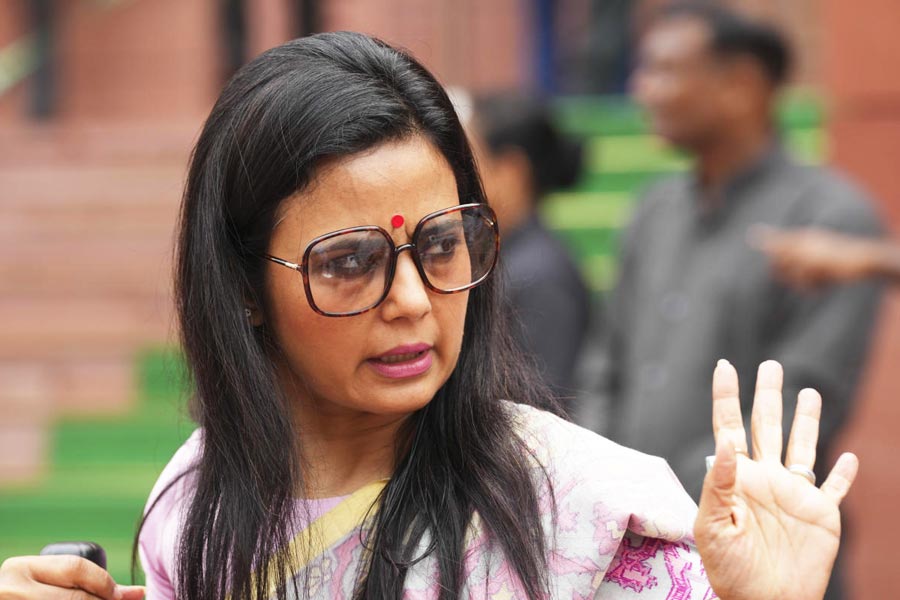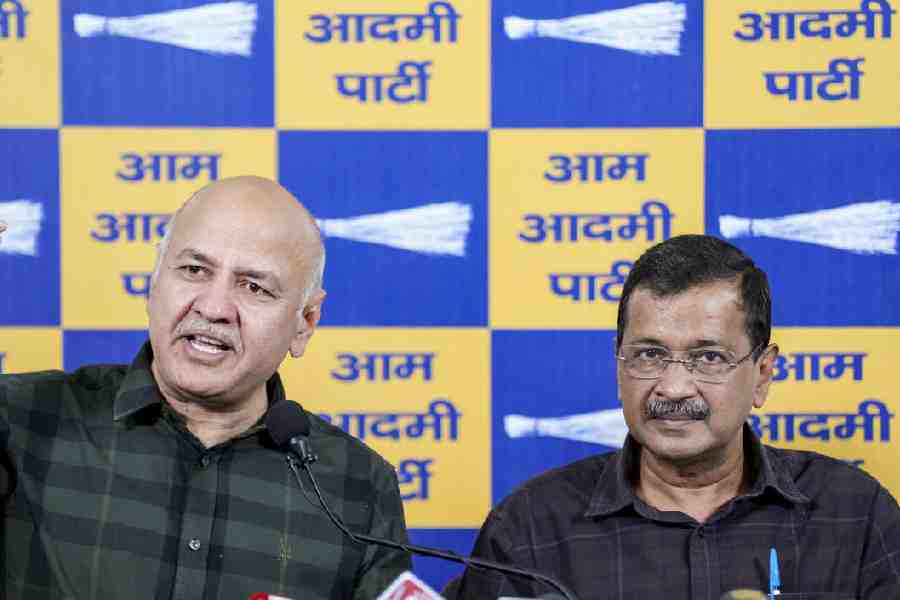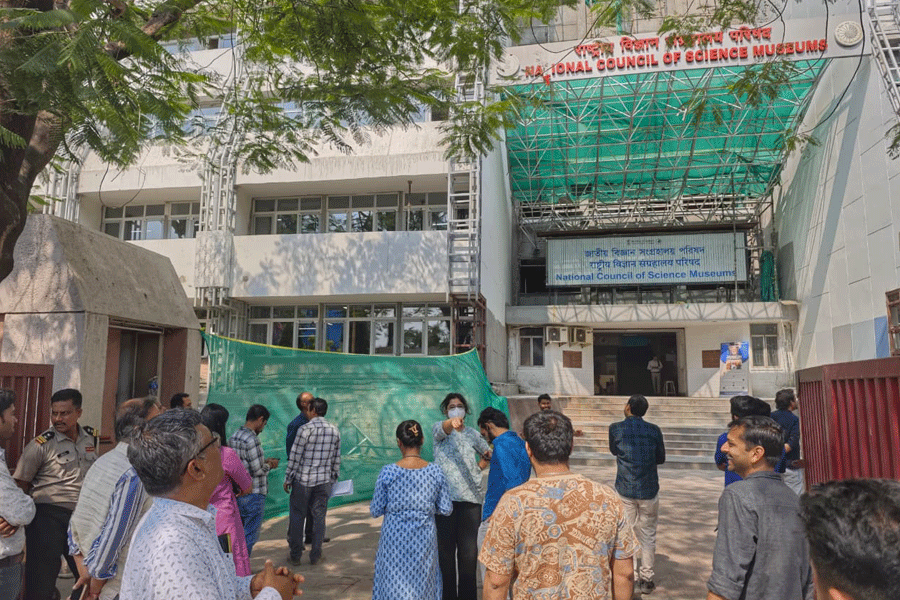TTOnline: The Jharkhand government organised a flight to bring back migrants? What made you do that?
Hemant Soren: It’s a surprise that no one seems to have known that we have such a large section of the population that are migrant workers, be it in UP, Bengal, Jharkhand or Bihar. Even I am surprised to note there is no place in the country where our people from Jharkhand isn’t there. From Ladakh, Kashmir to Kanyakumari, even in Andaman and Nicobar, and Lakshwadeep, islands, there are people from our state. They contribute to the economic prowess of our country by their participation in the workforce.
I was the first chief minister to organise flights for the return of migrants. I had been seeking permission from the Centre for long to be allowed to do this, even though in places like Uttar Pradesh, I am told, there was a process of back-door entry for workers that was continuing without any nod from the Union government. They were bringing back their people, including students from Kota, while we weren’t being given permission because for us, the distance was more. In fact, I had to tell the Centre that well, ‘if you do not give us permission, then I will have to look for alternate measures’. By then, finally, a blanket permission was issued by the Centre. Also, if you recall, there was another view about bringing back migrants, like in Bihar, that had initially refused to entertain their workers.
We set up a helpline to gather information about people who wanted to be brought back to the state. We even employed about 100 people to work round-the-clock to collate information. It was during this exercise that many people working in the difficult terrains of Leh and Ladakh got in touch with us. We followed up with them and realised that transport measures from here were limited. It was then that I decided that I would organise a flight to bring them back.
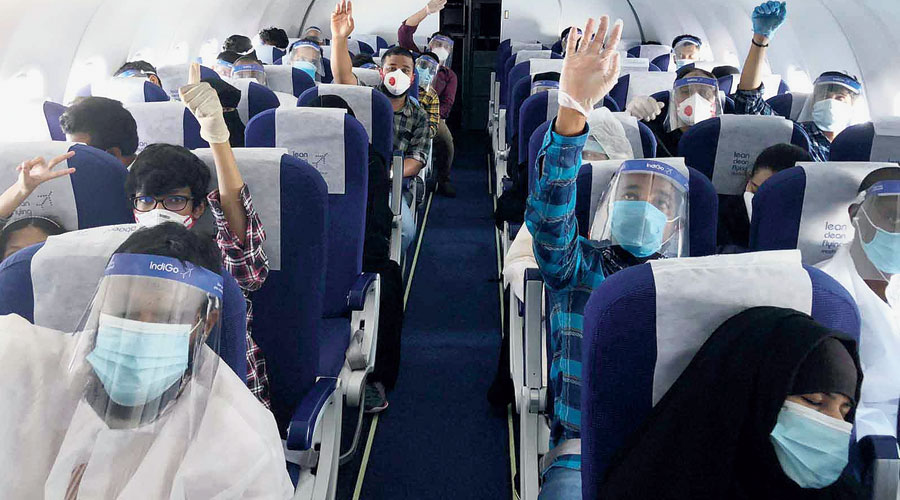
SAFE LANDING: A flight of migrant workers after landing at Ranchi airport. Telegraph picture
How did Border Roads Organisation get into the picture?
Border Roads Organisation got involved since most of those working in Leh and Ladakh were from here, working on their projects. They supported us not so much for our welfare, but because they realised that they are the ones who really need workers from Jharkhand to complete their projects, most of which are in extremely difficult terrain. Isko lekar unhone thodi haath badai aur hum ne usko puri sharir paakr li.
Soon, we realised that while we were talking about our workers, and organising their return, they had already made preparations to take back more workers from Jharkhand. In the meantime, MHA issued guidelines whereby it was mandated that trains could be operated to transport migrants only with the consent of respective state governments. It was then that BRO sought permission to run a few trains from some of our districts, primarily tribal districts (of Santhal Pargana). Their focus was on tribals.
I believe you asked BRO to sign a proper MoU with the state of Jharkhand?
Yes. Good question. When our officials spoke to some of those who had come back from these regions working on BRO projects, we realised that their living conditions were pathetic. In logo ka bahut bura halaath tha… I also spoke to defence minister Rajnath Singh and he told me that BRO paid around Rs 24,000 to Rs 25,000 to each worker. But when we spoke to some of them who had come back, we realised that they barely made Rs 5,000 to Rs 6,000 and, that too, with great difficulty.
It was then that I put my foot down. I made it clear that while I was not opposed to BRO transporting and using labour from Jharkhand, the process had to be through proper channel and without the use of agents. I referred to our labour laws and said these should be followed while using a workforce from here. Then, local leaders and junior officers worked out some sort of an informal MoU and ultimately, we allowed a train to go with 2,000 people, and with proper documentation.
So, will there be an MoU?
I have made it clear to BRO that henceforth, they should sign a proper MoU with the state government so that workers from Jharkhand can go and work on its projects with due respect, assured that they are protected by labour laws.
So, workers from Jharkhand are not going Leh anymore?
As of now, we have instructed our workers not to take up BRO projects in Leh and Ladakh or other areas. I am told that small groups of people are still being taken there through various other routes. Actually, I am aghast that such an informal arrangement has been allowed to continue, apparently for ages, and that too with the involvement of a Central government organisation. I have made it clear to BRO that if I do find out that workers are being taken from here through other routes, I will have to act and stop it.
Now that you have overcome the first challenge of getting people home, the next step is to provide them gainful employment. Yet, the realities of Jharkhand’s industrial stagnation cannot be wished away.
Human nature is to move from place to place. There is nothing unusual about this. Movement of people keeps the nation’s economic engine running. People will always go to places where there are better opportunities. Every place or every company has its own way, and capacity, of engaging people. And in case there are better avenues, then there is no harm in people going to such places. My only contention is that these appointments be done as per our labour laws. Because these laws have been framed after a lot thought. Of late, there has been several instances of blatant violations of labour laws. You have seen how on several occasions the central government has tried to dilute provisions of labour laws and how these attempts have led to widespread protests. There seems to be no one to think about the poor.
Today, companies are sending air tickets to workers, asking them to return to work in, say, a Mumbai, Delhi or Bangalore. If the same companies had shown similar concern at the time of the lockdown, given shelter to the workforce and provided them with resources, then perhaps we would not have been in such a dire situation today.
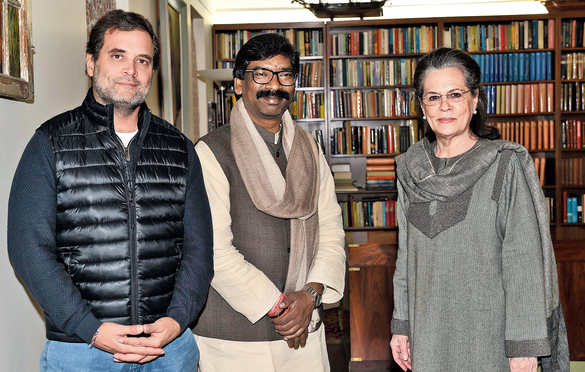
VICTORY SMILE: Hemant Soren with Sonia Gandhi and Rahul Gandhi in Delhi after the JMM-Congress-RJD alliance had swept the state polls in December 2019 Telegraph picture
You mean the big companies?
There are companies running in India that are valued at, say, 10 times the budget of Jharkhand. If these companies had extended a hand of support, things could have been much better. They (the BJP dispensation at the Centre) have strategically created a fund called, PMCARES. These companies are donating in that fund, but no one knows who and for what. They claimed that ventilators were bought with funds from PMCARES. But, apparently, an RTI query has revealed that no ventilators were bought using the fund. I am not sure about these claims. But what I am sure of is that there is no transparency in the way PMCAREs is being handled. And now, the Supreme Court has asked the government for a response on a plea that contributions made to PMCARES to fight Covid-19 be transferred entirely to the National Disaster Response Fund (NDRF).
When you took over in December 2019, the state of Jharkhand’s finances was dismal.
We had no money to pay salaries. Today, there is a money crisis nationally as well. Please understand that the economy was on a downturn when the BJP government came to power at the Centre in 2014. There was no Covid then. I have been appealing to the Prime Minister, during our interactions over video, to allow states to become financially stronger. The first thing the new government did was to enforce GST. And when that happened, it left states without the traditional backbone of generating resources. Today, states are left with limited powers of generating resources.
So, what do you propose?
I am in favour of a full roll back of GST. That way states can go back to generating its own resources. In any case, the implementation of GST is faulty. Ever since it was introduced, over one thousand changes have been made and God knows how many more changes are being sought to be made.
The Centre has announced a slew of incentives to revive the Covid-hit economy. How has Jharkhand benefitted?
I think most of the Centre’s announcements are floating in the air. I don’t see any concrete impact of these announcements on the people of our country. No new industries are opening, yet the Sensex is soaring. I do not understand this.
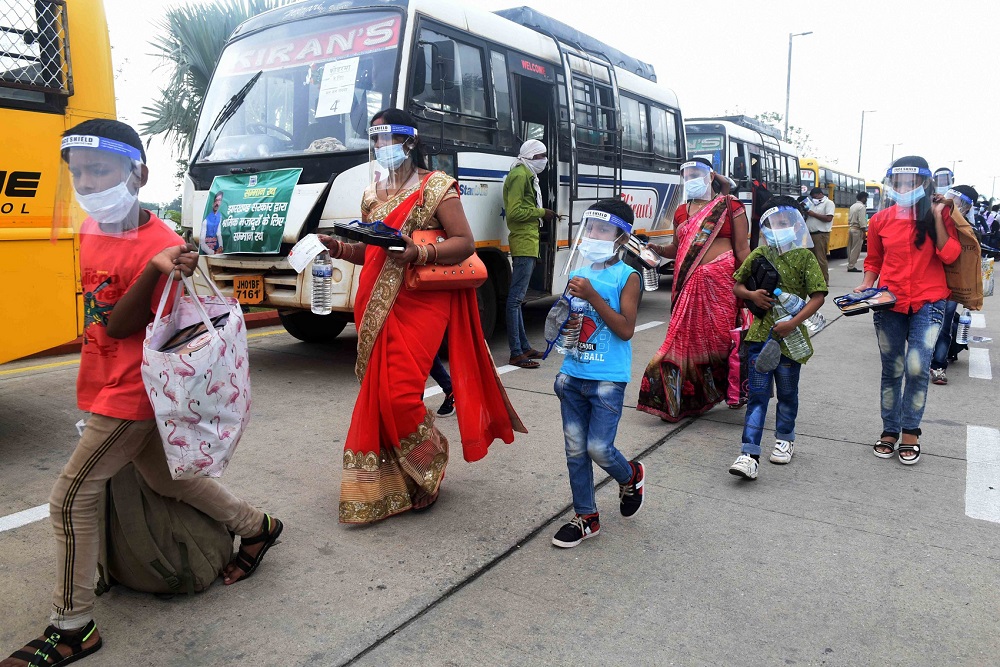
HOMEWARD BOUND: Migrant families board a bus after arriving at Ranchi airport in May. Telegraph picture
The Opposition BJP in Jharkhand is calling you anti-development because of your objection to the Centre’s move to allow commercial mining of coal.
Having left Covid to the hand of God, the BJP is busy trying to sell off PSUs, both profitable and loss-making. Look at railway. The minister beats his chest in Parliament and claims there is no plan to sell Indian railways nor will there ever be. But outside it is the opposite. Railways has been all but privatised. Even profitable entities like IOC, LIC are not been spared.
We got to know about the coal auction plan in the midst of the pandemic. And we conveyed to the Centre that this was perhaps not the time as not many companies would like to invest in such a climate of uncertainty. You are talking about 100 per cent FDI. When the country is under virtual lockdown and flights and train movement is scarce, who will come and invest here?
I was not so much against the idea of auction. What I wanted to impress on the Centre was that Jharkhand has a unique character. It has vast swathes of land with natural resources. It also has a significant population of tribals whose livelihood is intrinsically linked with land. Earlier experiences with mining companies have not been pleasant for locals. As a result, whenever such proposals are floated there is widespread opposition. We have scheduled areas here that are governed by a separate set of land laws. There could be issues of law and order, displacement and pollution. The government of Jharkhand will have to deal with these. All these implications need to be studied. So why the hurry? How can you decide on things without taking the concerned state into confidence?
We have, therefore, moved Supreme Court and it has issued a notice (July 14) to Centre seeking its response (within four weeks).
You are, therefore, not entirely opposed to the idea of commercial mining?
We consider mines and minerals as the primary resource for Jharkhand. If we place this resource in the market in the right way, I think it will benefit the people of the state. But if we rush through such a move, it is like jumping into the unknown… someone, or some company, in London or Mumbai or Ahmedabad will run the show. Who will the poor tribals deal with?
How has Jharkhand fared in tackling the Covid-19 outbreak, the Opposition is far from impressed?
First, I want to tell the people of the state that there is no need to panic because of the high number of positive cases that is coming up. I have been hearing whispers that the Centre feels we are hiding numbers to give the impression that the Covid situation is in control in Jharkhand.
I do not believe in hiding numbers. I understand that if I am able to test more and more people and have that data with me, then we will be in a better position to plan our fight against the virus. Months ago, we were testing 200 samples a day. Today, we are testing 8,000 samples a day. We will increase these numbers further. And because we are testing 8,000 or more samples, the number of positives may be in the range of 200. This is not a big issue.
Also, in spite of our meagre resources, both human as well as funds, we are trying to improve our healthcare apparatus, which in any case, is not strong enough. We have taken a number of decisions and working towards accommodating more patients at various locations depending on the extent of their symptoms. Before the advent of Covid-19, we used to run 18,000 to 20,000 community kitchens, in addition to distributing ration to the poor and needy. It is with immense satisfaction that I want to say that malnutrition levels, endemic to our state, have come down.
We have also started a programme for employment of labour in panchayats. This is, I am told, being followed by other states. We are working to improve our systems even further.
Last question. During your swearing-in several guests, many of them from India Inc, presented with you books instead of the customary bouquets. That was, we know, as per you wish. From Nobel laureates Esther Duflo and Abhijit Banerjee’s ‘Good Economics For Hard Times’ to ‘For the Love of India: The Life and Times of Jamsetji Tata’ it’s quite a collection. Have you managed to read any of them?
Sure. I go through some of them whenever I can find the time. But my real intention is to build a library which I want to gift to the state. I have started work on this project of mine. It may take some time, but I am very serious about pursuing this. I think a library, such as the one I am envisioning, will help our students and future generations.
Thank you, Hemantji, for your time.
Thank you.


